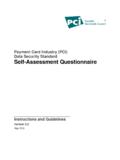Transcription of Payment Card Industry Data Security Standard (PCI …
1 Confidential Information Intended for Customers of Aldelo EDC 1 Payment card Industry data Security Standard (PCI-DSS) implementation guide For Aldelo EDC Version or Later Confidential Information Intended for Customers of Aldelo EDC 2 Confidential Information Intended for Customers of Aldelo EDC 3 Confidential Information Intended for Customers of Aldelo EDC Aldelo EDC Payment card Industry data Security Standard (PCI-DSS) implementation guide Aldelo EDC Version PUBLISHED BY Aldelo, LP 6800 Koll Center Parkway, Suite 310 Pleasanton, CA 94566 07/01/2016 Copyright 1997-2016 by Aldelo, LP All rights reserved. No part of the contents of this manual may be reproduced or transmitted in any form or by any means whatsoever without the written permission of the publisher.
2 This manual is available through Aldelo, LP and resellers worldwide. For further information, please contact Aldelo, LP or visit our website at Send comments about this manual to Aldelo is the registered trademark of Aldelo, LP. Other products or company names mentioned herein are the trademarks of their respective owners. The example companies, organizations, products, logos, people, places, and events depicted herein are fictitious. No association with any real company, organization, product, logo, person, place, or event is intended or should be inferred. For the sake of simplicity, all gender references are written only in the masculine. Any references to the masculine gender should be interpreted to include the feminine gender as well and vice versa, wherever applicable.
3 Confidential Information Intended for Customers of Aldelo EDC 4 Confidential Information Intended for Customers of Aldelo EDC 5 Reviewed by: Date Time Jeff Moore / Dave Ventura 03/28/2013 12:47 PM Jeff Moore / Dave Ventura 04/04/2013 12:06 PM Jeff Moore / Dave Ventura 05/30/2013 08:25 AM Jeff Moore / Dave Ventura 06/10/2013 09:20 AM Dave Ventura 08/06/2015 08:12 AM Jeff Moore / Dave Ventura 02/29/2016 10:47 AM Jeff Moore / Dave Ventura 07/01/2016 PM Confidential Information Intended for Customers of Aldelo EDC 6 Confidential Information Intended for Customers of Aldelo EDC 7 8 Confidential Information Intended for Customers of Aldelo EDC Table of Contents Chapter 1: Introduction to PCI-DSS Compliance .. 10 Chapter 2: PCI-DSS Payment Application Environment Requirements.
4 12 Access Control .. 12 Remote Access .. 13 Non-Console Administration .. 13 Transport Encryption .. 13 Encryption Key Management .. 14 Cardholder data Retention .. 15 Key Custodian .. 15 Network Segmentation .. 16 Windows Restore Points .. 16 Information Security Policy / Program .. 18 Chapter 3: Payment Application Configuration .. 20 Baseline System Configuration .. 20 Application Configuration .. 20 Wireless Configuration .. 20 Installing Internet Information Services .. 21 Installing .NET Framework .. 21 Installing Microsoft Point of Service for .NET .. 21 Installing SQL Server 2008 .. 22 Installing Aldelo EDC .. 22 Database Setup .. 22 Store Settings .. 23 Security Settings .. 24 Users .. 24 Merchant Accounts .. 25 Application Requirements .. 26 Chapter 4: Updates and References.
5 28 .. 28 Updates to Aldelo EDC .. 28 Technical Support .. 28 More Information .. 28 Application Versioning Methodology .. 29 Chapter 5: PA-DSS v Requirements .. 30 Confidential Information Intended for Customers of Aldelo EDC 9 Confidential Information Intended for Customers of Aldelo EDC 10 Chapter 1: Introduction to PCI-DSS Compliance Systems that process Payment transactions necessarily handle sensitive cardholder account information. The Payment card Industry (PCI) has developed Security standards for handling cardholder information in a published Standard called the Payment card Industry data Security Standard (PCI-DSS). The Security requirements defined in the PCI-DSS apply to all members, merchants, and service providers that store, process, or transmit cardholder data .
6 The PCI-DSS requirements apply to all system components within the Payment application environment which are defined as any network devices, hosts, or applications included in, or connected to, a network segment where cardholder data is stored, processed, or transmitted. The following high level 12 Requirements comprise the core of the PCI-DSS: Build and Maintain a Secure Network 1. Install and maintain a firewall configuration to protect data . 2. Do not use vendor-supplied defaults for system passwords and other Security parameters. Protect Cardholder data 3. Protect stored data . 4. Encrypt transmission of cardholder data and sensitive information across public networks. Maintain a Vulnerability Management Program 5. Use and regularly update anti-virus software.
7 6. Develop and maintain secure systems and applications. Implement Strong Access Control Measures 7. Restrict access to data by business need-to-know. 8. Assign a unique ID to each person with computer access. 9. Restrict physical access to cardholder data . Regularly Monitor and Test Networks 10. Track and monitor all access to network resources and cardholder data . 11. Regularly test Security systems and processes. Maintain an Information Security Policy 12. Maintain a policy that addresses information Security . Confidential Information Intended for Customers of Aldelo EDC 11 The remainder of this document describes the essential guidance for implementing Aldelo EDC in a PCI-DSS compliant environment. Confidential Information Intended for Customers of Aldelo EDC 12 Chapter 2: PCI-DSS Payment Application Environment Requirements Access Control The PCI-DSS requires that access to all systems in the Payment processing environment be protected through the use of unique user accounts and complex passwords.
8 Unique user accounts indicate that every account used is associated with an individual user and/or process, with no use of generic group accounts used by more than one user or process. Additionally, any default accounts provided with operating systems, databases, and/or devices should be removed/disabled/renamed as possible, or at least should have PCI-DSS compliant complex passwords and should not be used. Examples of default administrator accounts include administrator (Windows systems), sa (SQL/MSDE), and root (UNIX/Linux). Please note that Aldelo EDC does not use or contain any built-in application user accounts. The PCI-DSS Standard requires the following password complexity for compliance: Passwords must be at least 7 characters Passwords must include numeric, alphabetic (both upper and lower case), and special characters Passwords must be changed at least every 90 days New passwords cannot be the same as the last 4 passwords Do not use default user names and passwords, such as Administrator and 12345 Always use unique user names and passwords Users should never create shared usernames and passwords and each user must have a unique username and password that is appropriate to his system access level PCI-DSS user account requirements beyond uniqueness and password complexity are listed below.
9 If an incorrect password is provided 6 times, the account should be locked out Account lock out duration should be at least 30 minutes (or until an administrator resets it) Sessions idle for more than 15 minutes should require re-entry of username and password to reactivate the session Forgotten passwords may be reset by answering three challenge questions (the answers to these questions are setup when the user account is created) These same account and password criteria must also be applied to any applications or databases included in Payment processing to be PCI-DSS compliant. Confidential Information Intended for Customers of Aldelo EDC 13 Remote Access The PCI-DSS Standard requires that if employees, administrators, or vendors are granted remote access to the Payment processing environment, access should be authenticated using a multi-factor authentication mechanism (username/password and an additional authentication item such as a token or certificate).
10 In the case of vendor remote access accounts, in addition to the Standard access controls, vendor accounts should only be active while access is required to provide service. Access rights should include only the access rights required for the service rendered, and should be robustly audited. When not in use, remote access must be disabled. If remote access is used, the following guidelines must be adhered to: Change default settings in the remote-access software (for example, change default passwords and use unique passwords for each customer) Allow connections only from specific (known) IP/MAC addresses Use strong authentication and complex passwords for logins (See PA-DSS Requirements through ) Enable encrypted data transmission according to PA-DSS Requirement Enable account lockout after a certain number of failed login attempts (See PA-DSS Requirement ) Establish a Virtual Private Network ( VPN )




